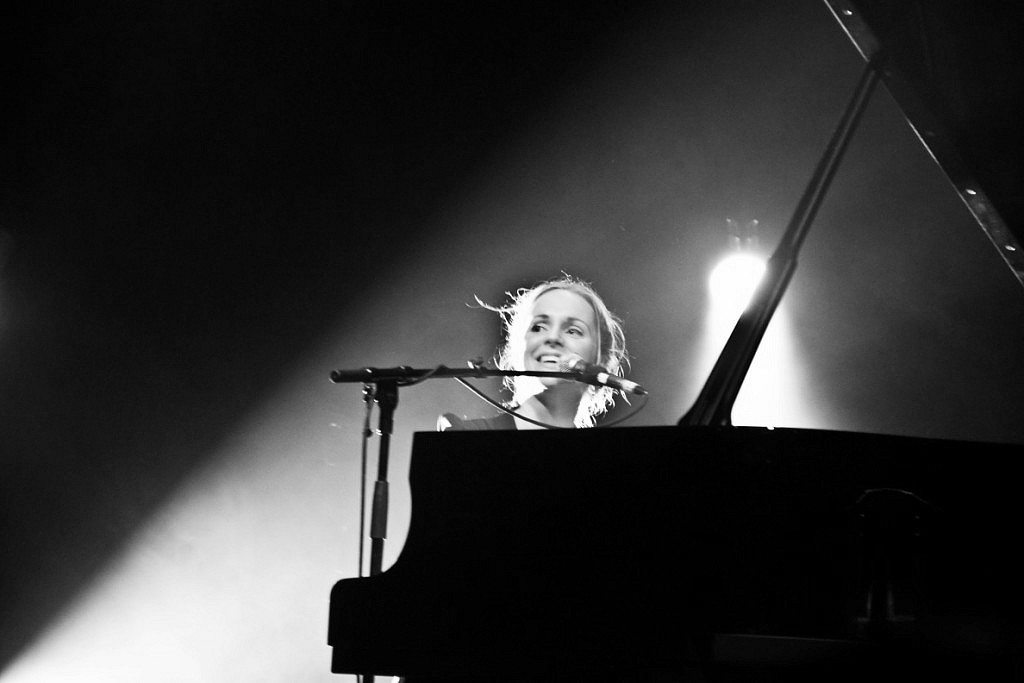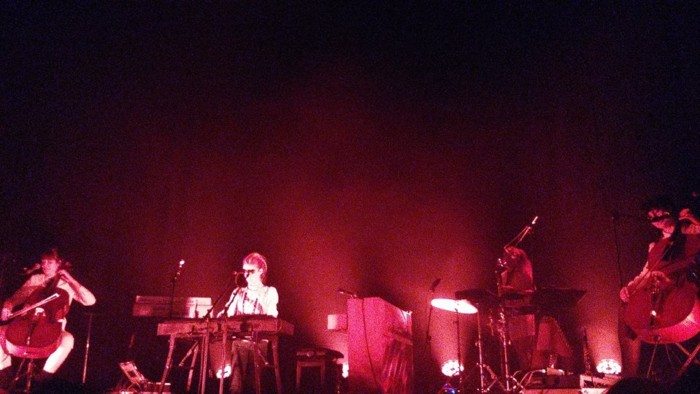Agnes Obel: “mystical, eerie enchantment”
The ancient walls of Birmingham Town Hall encompass the gathering audience as we sit cross-legged in anticipation, shadowy figures slowly taking their place to witness the spectacle. I say us, because after the paradoxically nihilist, yet hopeful support set by L.A Salami, the audience’s mood changes. No longer atomised, we all become a part of a cohesive whole – from man-bunned hipsters, groups of work colleagues, elderly couples dominating the balcony, to students seeking escapism from end of term deadlines – it becomes apparent that Agnes Obel’s music cuts through the divisions of age, gender and nationality.
As the last hushed whispers begin to die down, a bright flash of white appears in the form of Agnes and her quartet of “Snowflakes, the Moon Crew, or asylum patients”, as she later calls them due to their colour-coordinated outfits. They begin with ‘Red Virgin Soil’ from the most recent album, a surprising choice due to its being solely instrumental, but with the help of a menacing light show, it works perfectly to create the eerie atmospheric spectacle that haunts the whole set. The silence that defines the crowd does not subdue, even with the more familiar ‘Dorian’ that follows, the stillness only reinforcing the uncanniness of her performance.
Soon, the hallmark surreal and clandestine absurdism of Citizen of Glass begins to solidify onstage. With Alfred Hitchcock as one of Obel’s influences – something evident in the Philharmonics’ album cover paying an ode to The Birds – it is no wonder that the whole performance feels like some kind of a silent film; a type of sensory cinematic. As the sumptuous harmonies of ‘Trojan Horses’ flood the archaic venue, the true ‘Epic’ aura of the tale fills the atmosphere with a sense of the sublime. The quartet’s siren-like notes hypnotise the audience, who are now forced to experience the Odyssean desire to submerge in the oceanic waves created by simplistic projections of patterns on the surrounding walls. The ethereal sounds of looped cellos and booming drums transports the crowd into an untimely world of fantasy, filled with an inescapable presentiment of impending doom.
Unfortunately, the spell soon breaks as the set takes a slightly less dramatic turn. Agnes moves centre stage to the home piano that has kept her company through the tour, and recites a series of solitary creations – starting with a piece she deems too “romantic” to find a place on any of the albums – and it seems that the trance wears off; the veil of the surreal is abruptly breached. It takes a while for the quartet to find their feet again, but with a performance of ‘Philharmonics’ that Obel announces is about “freedom”, they break free from the slight rupture in the flow. It’s soon apparent that the titular track of the first album has had a make-over, and the clean, familiar tones are tainted with a spectre of darkness that recalls the earlier performances.
This becomes a recurring pattern for the second half of the set, with tracks both old and new recreating the mystical undercurrent of Obel’s newly developed style. It’s clear that she has found a new sanctuary in eerie additions of the automated harp, clarinet, trombone and cellos. In fact, it is through the adroit use of the instruments that the performances really come to life. The collective skill of the act is beyond comprehension, and this really comes through in the recreation of ‘The Curse’, which really emphasises the sinister nature of the song and the “hunger to live unlike before” with the troupe’s layering of instrumental prowess. The same can be said for one of the more widely known tracks ‘Riverside’, which transforms from a quaint, unblended piano piece to a concoction of covert elements unveiling the songs’ ominous undertones.
As the last encore piece, ‘On Powdered Ground’ – “a song about uncertainty, like most of my other songs”, Agnes proclaims – comes to an end, I’m also left with some questions regarding what course her music might take next. I can’t help but feel that the last words “don’t break your back on the track” still echoing the halls at our departure, might provide a clue that the only thing we can really expect is more of this mystical, eerie enchantment with sinister undertones that elevate Obel’s music beyond the now clichéd constraints of her modern ‘indie folk’ contemporaries.


Comments